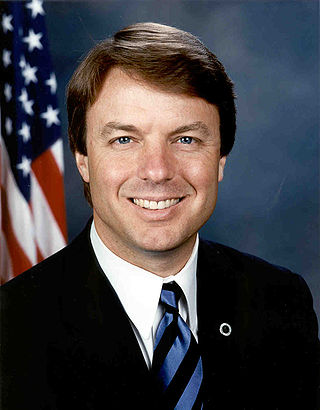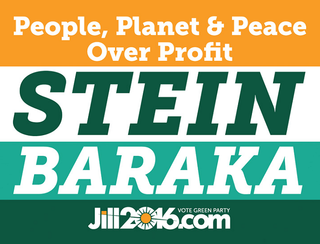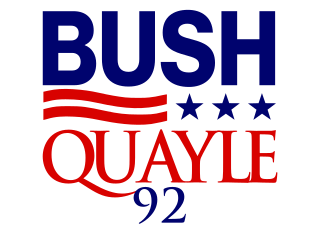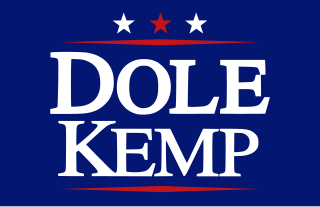
The 1996 United States presidential election was the 53rd quadrennial presidential election, held on Tuesday, November 5, 1996. Incumbent Democratic President Bill Clinton and his running mate incumbent Democratic Vice President Al Gore were re-elected to a second and final term defeating the Republican ticket of former Senate Majority Leader Bob Dole and former Secretary of Housing and Urban Development Jack Kemp and the Reform ticket of businessman Ross Perot and economist Pat Choate.

The 1992 United States presidential election was the 52nd quadrennial presidential election, held on Tuesday, November 3, 1992. Democratic governor Bill Clinton of Arkansas defeated incumbent Republican president George H. W. Bush and independent businessman Ross Perot of Texas. The election marked the end of a period of Republican dominance in American presidential politics that began in 1968, and also marked the end of 12 years of Republican rule of the White House, as well as the end of the Greatest Generation's 32-year American rule and the beginning of the baby boomers' 28-year dominance until 2020. It was the last time the incumbent president failed to win a second term until Donald Trump in 2020, as well as the first election since 1932 in which an elected incumbent Republican president was defeated.

Henry Ross Perot Sr. was an American businessman, politician and philanthropist. He was the founder and chief executive officer of Electronic Data Systems and Perot Systems. He ran an independent campaign in the 1992 U.S. presidential election and a third-party campaign in the 1996 U.S. presidential election as the nominee of the Reform Party, which was formed by grassroots supporters of Perot's 1992 campaign. Although he failed to carry a single state in either election, both campaigns were among the strongest presidential showings by a third party or independent candidate in U.S. history.

On March 2, 2004, Massachusetts Senator John Kerry became the presumptive Democratic nominee for president in the 2004 Presidential Election. Kerry selected North Carolina Senator John Edwards as his running mate on July 6, 2004. The Kerry–Edwards ticket was ultimately defeated by the Bush–Cheney ticket in the general election.

The 1992 presidential campaign of Bill Clinton, the then-governor of Arkansas, was announced on October 3, 1991, at the Old State House in Little Rock, Arkansas. After winning a majority of delegates in the Democratic primaries of 1992, the campaign announced that then-junior U.S. senator from Tennessee, Al Gore, would be Clinton's running mate. The Clinton–Gore ticket defeated Republican incumbent President George H. W. Bush and Vice President Dan Quayle in the presidential election on November 3, 1992, and took office as the 42nd president and 45th vice president, respectively, on January 20, 1993.

In 1992, Ross Perot ran unsuccessfully as an independent candidate for President of the United States. Perot was a Texas industrialist who had never served as a public official, but he had experience as the head of several successful corporations and had been involved in public affairs for the previous three decades. Grass-root organizations sprang up in every state to help Perot achieve ballot access following his announcement on the February 20, 1992, edition of Larry King Live. James Stockdale, a retired Navy vice admiral, was Perot's running mate.

Bob Graham was a candidate for President of the United States in the 2004 Democratic Party presidential primaries.

The 2016 United States presidential election was the 58th quadrennial presidential election, held on Tuesday, November 8, 2016. The Republican ticket of businessman Donald Trump and Indiana governor Mike Pence defeated the Democratic ticket of former secretary of state and First Lady of the United States Hillary Clinton and Virginia junior senator Tim Kaine, in what was considered one of the biggest political upsets in American history. It was the fifth and most recent presidential election in which the winning candidate lost the popular vote. It was also the sixth and most recent presidential election in U.S. history in which both major party candidates were registered in the same home state; the others have been in 1860, 1904, 1920, 1940, and 1944.

The 1992 United States presidential election in Florida took place on November 3, 1992, as part of the 1992 United States presidential election. The race was extremely close – so close in fact that some news networks mistakenly reported that Democratic challenger Bill Clinton had won in the state, although incumbent President George H. W. Bush was eventually declared the winner. Bush received 40.89% of the vote to Clinton's 39.00%. The final result in Florida reflected the reluctance of many Southern states to back fellow Southerner Clinton, although Clinton was polling well in other parts of the country.

John Kevin Delaney is an American politician, businessman, and former attorney who was the United States representative for Maryland's 6th congressional district from 2013 to 2019. He was a candidate in the 2020 Democratic presidential primaries.

Presidential primaries and caucuses were organized by the Democratic Party to select the 4,051 delegates to the 2016 Democratic National Convention held July 25–28 and determine the nominee for President in the 2016 United States presidential election. The elections took place within all fifty U.S. states, the District of Columbia, five U.S. territories, and Democrats Abroad and occurred between February 1 and June 14, 2016. Between 2008 and 2020, this was the only Democratic Party primary in which the nominee had never been nor had ever become President of the United States. This was the first Democratic primary to nominate a woman for President.
The following is a timeline of major events leading up to, during, and after the 2016 United States presidential election. The election was the 58th quadrennial United States presidential election, held on November 8, 2016. The presidential primaries and caucuses were held between February 1 and June 14, 2016, staggered among the 50 states, Washington, D.C., and U.S. territories. The U.S. Congress certified the electoral result on January 6, 2017, and the new president and vice president were inaugurated on January 20, 2017.

Jill Stein, a physician from Massachusetts, announced her entry into the 2016 United States presidential election on June 22, 2015. Stein had been the Green Party's presidential nominee in 2012, in which she received 469,627 votes. In the 2016 election, she once again secured the Green Party nomination and lost in the general election. She received 1.07% of the popular vote and no electoral college delegates.

New York real estate magnate Donald Trump announced the creation of a presidential exploratory committee on the October 7, 1999, edition of Larry King Live on CNN. Although Trump had never held elected office, he was well known for his frequent comments on public affairs and business exploits as head of The Trump Organization. He had previously considered a presidential run in 1988 as a Republican, but chose not to run. For 2000, Minnesota Governor Jesse Ventura persuaded Trump to seek the presidential nomination of the Reform Party, which was fracturing despite achieving ballot access and qualifying for matching funds as a result of businessman Ross Perot's 1996 presidential campaign on the party's ticket.

The 1992 presidential campaign of George H. W. Bush was an unsuccessful re-election campaign for 1992 United States presidential election by incumbent president George H. W. Bush, who had taken office on January 20, 1989. Bush and incumbent vice president Dan Quayle were defeated by Democratic presidential nominee Bill Clinton and vice presidential nominee Al Gore. Bush, a Republican president and former vice president under Ronald Reagan, launched his presidential bid on October 11, 1991, and secured nomination for his re-election on August 20, 1992. He was challenged in the Republican primaries by former White House Communications Director Pat Buchanan, who received less than one percent of the delegates in the Republican National Convention.

The 1996 presidential campaign of Bob Dole began when Republican Senator and Senate Majority Leader Bob Dole formally announced his candidacy for Republican Party nomination in 1995. After beating other candidates in the primaries, he became the Republican nominee, with his opponent being Democratic incumbent President Bill Clinton in the 1996 presidential election. Dole conceded defeat in the race in a telephone call to Clinton on November 5, 1996.
The following table is the list of newspaper endorsements in the 1992 United States presidential election. It mostly contains major newspapers of 1992, which made their presidential endorsement from September–November 1992. Many newspaper, who had made their endorsement for George H. W. Bush in 1988 presidential election endorsed Bill Clinton in the 1992 election. Harford Courant's 1992 endorsement of Clinton was their first Democratic presidential endorsement in its 228 years of continuous publication.

The 2000 presidential campaign of Dan Quayle, former vice president of the United States, began with an announcement on January 21, 1999 that he was forming an exploratory committee. Several months later, on April 14, he officially announced his candidacy for the Republican Party nomination. Dan Quayle had been an elected member of Congress since 1977, and he was George H. W. Bush's running mate in his successful 1988 presidential campaign, serving as vice president from 1989 to 1993, losing reelection in 1992. Throughout his time in government, he was considered a staunch conservative who was especially popular among the Christian right, but several gaffes during his vice presidency had damaged his reputation among the general public. Though he had initially considered running for president in 1996, he ultimately passed on this.
The 1992 presidential campaign of Tom Harkin, a U.S. Senator from Iowa, began with a campaign rally on September 15, 1991. Harkin had first been elected to a national office in 1974 as a member of the House of Representatives, serving from 1975 to 1985, when he became a senator. A member of the Democratic Party, Harkin established himself as a populist liberal, supporting New Deal-style policies while receiving broad support from organized labor and left-leaning voters. Harkin was very critical of then-President George H. W. Bush, a conservative Republican, and positioned himself as the most liberal candidate in the Democratic field. His policy positions included support for a national health insurance system, cuts to military funding, and increased funding for infrastructure.
















